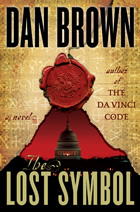BOOK REVIEW:
Before the furore over "The Da Vinci Code", Dan Brown was just about any other mystery thriller novelist. But here we are, with anticipation and sales for his latest book "The Lost Symbol" building to fever pitch- thanks in part to the movie adaptations of both "The Da Vinci Code" and "Angels and Demons". Both stories had as its lead character Harvard symbologist Robert Langdon and Langdon makes a return here in yet another story that mixes science and religion.
After taking on the Catholic Church (twice), Dan Brown shifts his sights to the Freemasons, a fraternal organisation with origins that date back to the late 16th or early 17th century. Just like the Church, the Freemasons are rooted in rituals and symbolism, and are sometimes referred to as a 'society with secrets'. Myth or fact, it is also said that some of America’s founding fathers were part of the highest order of this fraternity, the 33rd degree Freemasons.
If all this sounds familiar, that’s because Nicolas Cage’s Ben Gates had once tried uncovering these secrets in "National Treasure". Dan Brown’s stab at the Freemasons sets Langdon in a race-against-time (isn’t it always) chase around Washington D.C to save his dear friend, Peter Solomon, head of the Smithsonian Institute and a 33rd degree Mason. Solomon has been kidnapped by a misguided Masons, Mal’akh, who wants Solomon to unlock the Ancient Mysteries of the Masons which he believes will point to the Word-the Word that will apparently make him a god.
If that sounds like hokey nonsense, wait for this- Dan Brown also proposes a new frontier of science, a discipline he calls 'noetic science'. Basically, it means that if you put enough of your mind to something, it’s enough to actually bring about a physical change. Apparently, the untapped parts of our mind possess that level of potential, within which of course lies infinite possibilities. During the course of the novel, Brown will try to reconcile the differences between science and religion, positing that the Freemasons had that knowledge that was eventually hidden.
The fact that the previous two paragraphs began with an 'if' is no coincidence- indeed, "The Lost Symbol" rests on a lot of 'ifs', and it is presumably this cavalier attitude with which Dan Brown has treated the subjects of his book that may earn the ire of readers. But the best way to appreciate any Dan Brown novel is to throw out all his nonsense claims of how it is based on fact and take it as a pure work of fiction.
In that regard, "The Lost Symbol" is a guilty pleasure- a fast-paced, thrilling adventure that takes you to the Capitol’s secret sub-basement, the Library of Congress, the George Washington Masonic National Memorial, the Washington National Cathedral on the way to its rip-roaring finish. The only caveat is that one has to put with Brown’s somewhat lengthy chunks of exposition on Freemasons and religion in between- and yes, Brown does get a little self-indulgent a little too often.
Still, if you’ve read and liked "Angels and Demons" or "The Da Vinci Code", you’ll definitely enjoy "The Lost Symbol". Packed with mystery, excitement and suspense, Dan Brown fashions another novel that succeeds as a pure work of fiction- IF you can suspend your disbelief. And that’s a big if.
CHOICE XCERPT:
"Then don’t think of it as faith. Think of it simply as changing your perspective, accepting that the world is not precisely as you imagine. Historically, every major scientific breakthrough began with a simple idea that threatened to overturn all of our beliefs. The simple statement ‘the earth is round’ was mocked as utterly impossible because most people believed the oceans would flow off the planet. Heliocentricity was called heresy. Small minds have always lashed out at what they don’t understand. There are those who create . . .and those who tear down. That dynamic has existed for all time. But eventually the creators find believers, and the number of believers reaches a critical mass, and suddenly the world becomes round, or the solar system becomes heliocentric. Perception is transformed, and a new reality is born."
VERDICT:
   
Review
by Gabriel Chong
|

